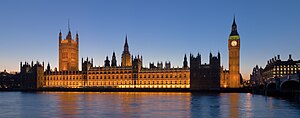UK government plans to replace House of Lords with elected chamber
Monday, March 15, 2010

Image: David Iliff.
The UK government plans to replace the House of Lords, the upper house of British Parliament, with a duly elected one to make it "legitimate." Ministers working on this proposal plan to style this new chamber loosely on the United States Senate.
Transport Secretary Lord Andrew Adonis said on a BBC show, "The time has now come to make it legitimate in the only way that a legislative assembly can be legitimate in the modern world, which is to be elected." He assured that there would be "firm proposals" for an elected House of Lords in the Labour Party's manifesto for the general election in May. He added "We can do it in this country as most democracies do it: We'd have two chambers, both of which are elected but with the government accountable to the first chamber."
The Sunday Telegraph has leaked a plan which reveals that the 704 seats would be reduced to 300 seats and its members elected under a system of "proportional representation". This new chamber would no longer be known as the House of Lords and citizens will have the privilege to remove incompetent members through a "recall ballot". The paper reported that each member would serve up to fifteen years and one-third of the chamber would be elected during the usual general elections. The salary is reported to be around £65,000 per annum. All members should be UK residents and fully domiciled for tax purposes.
The Lords scrutinise and revise government legislation and are seen by the public as an undemocratic house or a place for the aristocrats and political appointees. The chamber currently has around 740 members. 92 hold hereditary seats, and 26 are Church of England clergy. The rest are appointed for life.
Former prime minister Tony Blair, with the 1999 House of Lords act, had expelled hereditary peers from the upper house, apart from the 92 permitted to remain in the House on an interim basis. Another ten inheritors were created life peers to be able to remain in the House. Lord Adonis commented that this expulsion had "fundamentally transformed" the chamber into a "workmanlike assembly".
A spokesman for the Conservative Party (which is the opposition party) alleged that Labour was playing politics with the electoral system by introducing such proposals before the General election despite having thirteen years to reform the Lords. "We will work to build a consensus for a mainly elected second chamber to replace the House of Lords," he added.
For centuries, the House of Lords had included several hundred members who inherited their seats; the 1999 Act removed such a right. The Act decreased the membership of the House from 1,330 to 669. The Labour Government is expected to present a bill to remove the remaining 92 hereditary peers from the House. It also introduced in 2009 the Constitutional Reform and Governance Bill, which would end by-elections to replace hereditaries, removing them by steady reduction instead of removing all of them outright.
Sources
- "Government plans elected House of Lords" — Agence France Presse, March 15, 2010
- "Plans for fully elected House of Lords 'due shortly'" — BBC News Online, March 14, 2010
- Polly Curtis. "Labour pledge to replace House of Lords with elected chamber" — The Guardian, March 14, 2010

